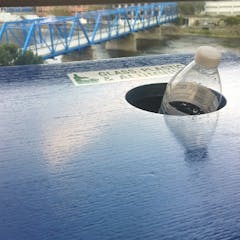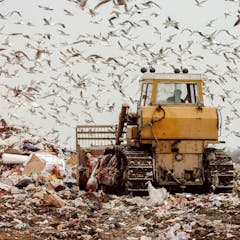
Articles on Landfill
Displaying 41 - 60 of 66 articles

Old landfills could be, quite literally, untapped gold mines.

Incineration of household waste has gotten a bad name, argues an economist, who sees today’s recycling crisis as an opportunity to reconsider how the U.S. handles its waste.

Seagulls have no qualms about sifting through dumps for scraps. But this buffet comes at a cost, filling their stomachs with plastic, glass, metal and even building materials.

Big solar has a potentially bright future in cities, but we need to get the planning right first.

Connecting smugglers, disposable workers, garbage pickers and the poorest of consumers, the flip-flop trail is one of globalisation’s darker stories.

We all know that tap water is better than buying bottled water, from an environmental standpoint at least. But what should you drink it out of? A single-use bottle, used multiple times, might be best.

Ipswich Council has stopped recycling and it’s likely that others around Australia will follow suit.

Victoria’s proposed ban on single-use plastic bags is a step forward, but what about all the other unnecessary packaging? A truly effective waste policy should offer a comprehensive plan for packaging.

The world’s largest recyclable materials importer will leave other countries searching for alternative waste management solutions.

Landfills produce huge amounts of methane. Many of the bigger operators capture it to turn into energy, but they’re wasting about 80% of what’s available. It’s time Australia stepped up.

The Victorian government is auditing every recycling facility in the state after a disastrous fire at Coolaroo. It raises a bigger issue: we don’t know how many plants Australia has or where they are.

City dwellers are individually starting to do their bit to live sustainably. Now pioneering businesses are aiming to make ecological and social sustainability part of their bottom line.

Australia sends 20 million tonnes of garbage to landfill every year. With thousands of sites across the nation, it’s hard to track exactly how many there are, where they are, and what’s filling them.

A recycling company has received tens of millions from the federal government to develop solid waste fuel. This fuel reduces landfill, shrinks our carbon footprint and protects the environment.

Australia’s recycling rules can seem horrendously complicated. But there a few golden rules to follow.

More Australians are recycling than ever, but let’s not forget that avoiding waste in the first place is the best option.

Well-intended efforts to reduce food waste could threaten some birds and animal species, a new paper has warned.

Australians send about 4 million tonnes of food waste to landfill each year – but what if we could use it for other purposes?

Australia is among the world’s top ten users of electronic and electrical products. But our systems for recycling the resulting ‘e-waste’ fall a long way short of other rich nations.

Hull City Council claims poor recycling habits are costing it £50,000 a month, so now they’re taking action by removing resident’s bins.
